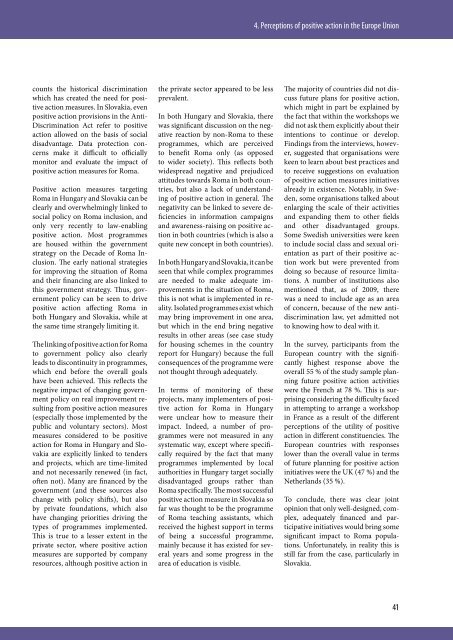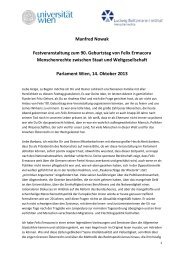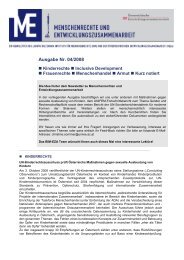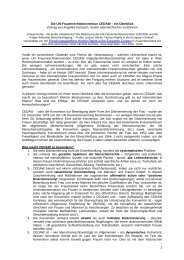International perspectives on positive action measures - European ...
International perspectives on positive action measures - European ...
International perspectives on positive action measures - European ...
You also want an ePaper? Increase the reach of your titles
YUMPU automatically turns print PDFs into web optimized ePapers that Google loves.
counts the historical discriminati<strong>on</strong><br />
which has created the need for <strong>positive</strong><br />
acti<strong>on</strong> <strong>measures</strong>. In Slovakia, even<br />
<strong>positive</strong> acti<strong>on</strong> provisi<strong>on</strong>s in the Anti-<br />
Discriminati<strong>on</strong> Act refer to <strong>positive</strong><br />
acti<strong>on</strong> allowed <strong>on</strong> the basis of social<br />
disadvantage. Data protecti<strong>on</strong> c<strong>on</strong>cerns<br />
make it difficult to officially<br />
m<strong>on</strong>itor and evaluate the impact of<br />
<strong>positive</strong> acti<strong>on</strong> <strong>measures</strong> for Roma.<br />
Positive acti<strong>on</strong> <strong>measures</strong> targeting<br />
Roma in Hungary and Slovakia can be<br />
clearly and overwhelmingly linked to<br />
social policy <strong>on</strong> Roma inclusi<strong>on</strong>, and<br />
<strong>on</strong>ly very recently to law-enabling<br />
<strong>positive</strong> acti<strong>on</strong>. Most programmes<br />
are housed within the government<br />
strategy <strong>on</strong> the Decade of Roma Inclusi<strong>on</strong>.<br />
The early nati<strong>on</strong>al strategies<br />
for improving the situati<strong>on</strong> of Roma<br />
and their financing are also linked to<br />
this government strategy. Thus, government<br />
policy can be seen to drive<br />
<strong>positive</strong> acti<strong>on</strong> affecting Roma in<br />
both Hungary and Slovakia, while at<br />
the same time strangely limiting it.<br />
The linking of <strong>positive</strong> acti<strong>on</strong> for Roma<br />
to government policy also clearly<br />
leads to disc<strong>on</strong>tinuity in programmes,<br />
which end before the overall goals<br />
have been achieved. This reflects the<br />
negative impact of changing government<br />
policy <strong>on</strong> real improvement resulting<br />
from <strong>positive</strong> acti<strong>on</strong> <strong>measures</strong><br />
(especially those implemented by the<br />
public and voluntary sectors). Most<br />
<strong>measures</strong> c<strong>on</strong>sidered to be <strong>positive</strong><br />
acti<strong>on</strong> for Roma in Hungary and Slovakia<br />
are explicitly linked to tenders<br />
and projects, which are time-limited<br />
and not necessarily renewed (in fact,<br />
often not). Many are financed by the<br />
government (and these sources also<br />
change with policy shifts), but also<br />
by private foundati<strong>on</strong>s, which also<br />
have changing priorities driving the<br />
types of programmes implemented.<br />
This is true to a lesser extent in the<br />
private sector, where <strong>positive</strong> acti<strong>on</strong><br />
<strong>measures</strong> are supported by company<br />
resources, although <strong>positive</strong> acti<strong>on</strong> in<br />
the private sector appeared to be less<br />
prevalent.<br />
In both Hungary and Slovakia, there<br />
was significant discussi<strong>on</strong> <strong>on</strong> the negative<br />
reacti<strong>on</strong> by n<strong>on</strong>-Roma to these<br />
programmes, which are perceived<br />
to benefit Roma <strong>on</strong>ly (as opposed<br />
to wider society). This reflects both<br />
widespread negative and prejudiced<br />
attitudes towards Roma in both countries,<br />
but also a lack of understanding<br />
of <strong>positive</strong> acti<strong>on</strong> in general. The<br />
negativity can be linked to severe deficiencies<br />
in informati<strong>on</strong> campaigns<br />
and awareness-raising <strong>on</strong> <strong>positive</strong> acti<strong>on</strong><br />
in both countries (which is also a<br />
quite new c<strong>on</strong>cept in both countries).<br />
In both Hungary and Slovakia, it can be<br />
seen that while complex programmes<br />
are needed to make adequate improvements<br />
in the situati<strong>on</strong> of Roma,<br />
this is not what is implemented in reality.<br />
Isolated programmes exist which<br />
may bring improvement in <strong>on</strong>e area,<br />
but which in the end bring negative<br />
results in other areas (see case study<br />
for housing schemes in the country<br />
report for Hungary) because the full<br />
c<strong>on</strong>sequences of the programme were<br />
not thought through adequately.<br />
In terms of m<strong>on</strong>itoring of these<br />
projects, many implementers of <strong>positive</strong><br />
acti<strong>on</strong> for Roma in Hungary<br />
were unclear how to measure their<br />
impact. Indeed, a number of programmes<br />
were not measured in any<br />
systematic way, except where specifically<br />
required by the fact that many<br />
programmes implemented by local<br />
authorities in Hungary target socially<br />
disadvantaged groups rather than<br />
Roma specifically. The most successful<br />
<strong>positive</strong> acti<strong>on</strong> measure in Slovakia so<br />
far was thought to be the programme<br />
of Roma teaching assistants, which<br />
received the highest support in terms<br />
of being a successful programme,<br />
mainly because it has existed for several<br />
years and some progress in the<br />
area of educati<strong>on</strong> is visible.<br />
4. Percepti<strong>on</strong>s of <strong>positive</strong> acti<strong>on</strong> in the Europe Uni<strong>on</strong><br />
The majority of countries did not discuss<br />
future plans for <strong>positive</strong> acti<strong>on</strong>,<br />
which might in part be explained by<br />
the fact that within the workshops we<br />
did not ask them explicitly about their<br />
intenti<strong>on</strong>s to c<strong>on</strong>tinue or develop.<br />
Findings from the interviews, however,<br />
suggested that organisati<strong>on</strong>s were<br />
keen to learn about best practices and<br />
to receive suggesti<strong>on</strong>s <strong>on</strong> evaluati<strong>on</strong><br />
of <strong>positive</strong> acti<strong>on</strong> <strong>measures</strong> initiatives<br />
already in existence. Notably, in Sweden,<br />
some organisati<strong>on</strong>s talked about<br />
enlarging the scale of their activities<br />
and expanding them to other fields<br />
and other disadvantaged groups.<br />
Some Swedish universities were keen<br />
to include social class and sexual orientati<strong>on</strong><br />
as part of their <strong>positive</strong> acti<strong>on</strong><br />
work but were prevented from<br />
doing so because of resource limitati<strong>on</strong>s.<br />
A number of instituti<strong>on</strong>s also<br />
menti<strong>on</strong>ed that, as of 2009, there<br />
was a need to include age as an area<br />
of c<strong>on</strong>cern, because of the new antidiscriminati<strong>on</strong><br />
law, yet admitted not<br />
to knowing how to deal with it.<br />
In the survey, participants from the<br />
<strong>European</strong> country with the significantly<br />
highest resp<strong>on</strong>se above the<br />
overall 55 % of the study sample planning<br />
future <strong>positive</strong> acti<strong>on</strong> activities<br />
were the French at 78 %. This is surprising<br />
c<strong>on</strong>sidering the difficulty faced<br />
in attempting to arrange a workshop<br />
in France as a result of the different<br />
percepti<strong>on</strong>s of the utility of <strong>positive</strong><br />
acti<strong>on</strong> in different c<strong>on</strong>stituencies. The<br />
<strong>European</strong> countries with resp<strong>on</strong>ses<br />
lower than the overall value in terms<br />
of future planning for <strong>positive</strong> acti<strong>on</strong><br />
initiatives were the UK (47 %) and the<br />
Netherlands (35 %).<br />
To c<strong>on</strong>clude, there was clear joint<br />
opini<strong>on</strong> that <strong>on</strong>ly well-designed, complex,<br />
adequately financed and participative<br />
initiatives would bring some<br />
significant impact to Roma populati<strong>on</strong>s.<br />
Unfortunately, in reality this is<br />
still far from the case, particularly in<br />
Slovakia.<br />
41

















